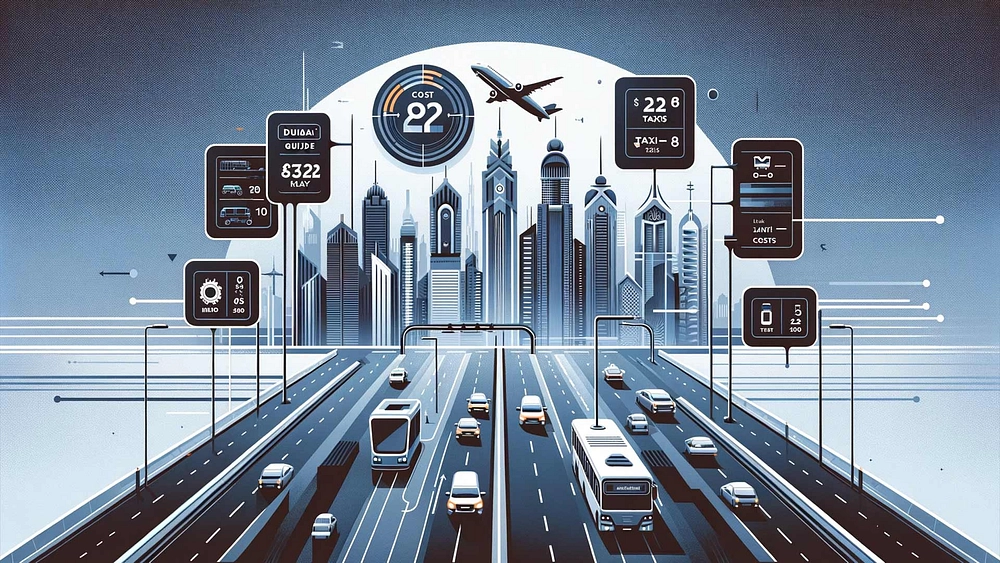Signature Collection
Explore SignatureDubai, a city of marvels, is known for it towering skyscrapers, award-winning attractions, and an extensive and efficient transport network. Dubai transportation is synonymous with opulence and innovation, mirroring the forward-thinking ethos of the global city. You can find an array of sophisticated modes for commuting, including iconic metro lines, water taxis, eco-friendly buses, and more.
The Dubai Roads and Transport Authority (RTA) plays a crucial role in developing and maintaining an integrated transportation system in Dubai. Let's explore the scenic sites using the state-of-the-art services in Dubai. Our comprehensive guide has all the details, from transport modes to service fares.
Nol Cards and Tickets
The Nol Card Dubai is a smart card used for public transportation services in Dubai. It is an integrated payment solution for the Dubai Metro, buses, trams, and water buses. The card comes in various types, including:
- Nol Silver Card: Featuring an e-purse, which can be loaded with up to AED 1000 upon registration. Obtain this card effortlessly from any ticket office for just AED 25, including the AED 19 e-purse value.
- Nol Gold Card: Offering exclusive access to the premium Gold Class seats on the metro for an elevated fare. The card costs just AED 25, along with AED 19 e-purse value.
- Nol Personal Card: A personalized smart card with an e-purse that can be loaded with up to AED 5000. Acquire this card instantly from any ticket office for only AED 70, including the AED 20 e-purse value.
- Nol Red Ticket: A paper-based ticket purchasable from any ticket vending machine for just AED 2. It can be loaded with up to 10 Single Trips.
Travelers can purchase and top up their Nol cards Dubai at various locations, such as metro stations, bus stations, and selected supermarkets, to pay for their Dubai public transport tickets. Additionally, the Nol card Dubai allows for seamless transfers between different modes of transportation within a specified time frame, making commuting more convenient for residents and visitors in Dubai.
Dubai Public Transportation Apps
In Dubai, several public transport apps cater to the diverse needs of travelers, offering features for planning journeys, making inquiries, and conducting transactions. Explore these apps to ensure a smooth and convenient travel experience:
Wojhati
The Wojhati app utilizes a real-time map to help users plan their journeys in advance.
Users can input their destination, and the app will present the optimal route using various public transport modes in Dubai, including buses, metro, and marine options.
RTA App
The RTA Public Transport Dubai app is a practical tool that enables users to check or top up their NOL card balance online. This app provides comprehensive information on metro, bus, and tram schedules, facilitating efficient journey planning.
S’hail
S’hail is a user-friendly app that integrates information on diverse public transport modes, offering a hassle-free experience for residents and visitors navigating the city.
Users can access Dubai metro and tram timings, taxi fares, as well as information on ride-hailing services like Uber and Careem, and car-sharing options such as UDrive and Ekar.
Aside from these, ride-hailing apps like Uber and Careem can also be utilized for booking services. Notably, the Careem app in Dubai now allows commuters to book the Hala Taxi, recognized as one of the most cost-effective taxi services in the city. Embrace the convenience of these apps to enhance your public transportation experience in Dubai.
Public Transportation in Dubai
From the iconic Dubai Metro to comprehensive bus networks and innovative ride-hailing services, there are many facets of public transportation in Dubai that define the heartbeat of the vibrant and bustling urban landscape. Join us on a journey to find out what makes Dubai's public transportation a model of efficiency, convenience, and modernity.
Dubai Metro
Dubai Metro is one of the most important parts of the Dubai public transport system. Offering a smooth and futuristic ride, the metro connects key areas, providing a fast and convenient way for residents and tourists to traverse the city. Dubai metro ticket price starts from AED 4.

Dubai Metro Route
The Dubai Metro has two main lines: Green and Red. The Green Line from Etisalat Metro Station to Creek Metro Station connects areas and attractions like Al Qusais, Al Ittihad Square, and Dubai Healthcare City. While the Red Line between Centrepoint and Expo 2020 metro stations has stops near landmarks including, Burj Khalifa, Dubai Mall, Business Bay, Jumeirah Lakes Towers, Dubai Marina, and Mall of the Emirates. Note that the metro route from Jabal Ali to Expo 2020 is called Route 2020, an extension of the Red Line introduced in 2015 for the World Expo 2020 hosted by Dubai.
Here is the list of metro stations on the Green Line route:
Also, check out the list of strategically located metro stations on the Red Line:
Moreover, there are interchange stations that allow passengers to change from green to red line or vice versa. The names and routes of these interchange stations on the Dubai Metro are given below:
- Red Line R18 and Green Line G20 interchange at Union
- Red Line R19 and Green Line G26 interchange at BurJuman
- Red Line R38 interchange with Branch Line at Jabal Ali
- Red Line R36 interchange with Tram Line at SHOBHA Realty
- Red Line R37 interchange with Tram Line at DMCC
How to pay for metro fares in Dubai?
You can pay the Dubai Metro price by purchasing a single-use train ticket or a Nol card Dubai at any Dubai Metro station, bus station, or participating supermarkets like Carrefour, Spinneys, and Waitrose. To add credit to your Nol card Dubai, you can use the vending machines or visit the ticket booths at each metro station.
The Dubai Metro trains provide three distinct service classes: Silver Class, Women and Children Only, and Gold Class. Silver Class is the standard service, while Gold Class represents the metro's equivalent of first class. Although Gold Class comes at a higher cost, it includes amenities like individual seating.
Dubai Metro Cost
The Dubai Metro provides two travel classes: standard class and gold class. While the Dubai Metro Gold class price is higher, it offers passengers a more comfortable setting, featuring expansive individual seats.
Taxi Service
Taxis are another widely favored option for public transportation in Dubai, available throughout nearly every part of the city. Although taxis in Dubai are pricier than other public transport alternatives, they offer the fastest and most comfortable means of navigating the city.
Dubai taxis include dedicated services for airport transportation, and there are also specialized taxis exclusively for women and families, featuring female drivers for added comfort and convenience. Taxi prices in Dubai cost 12 AED minimum and an extra fare of 1.97 AED per kilometer. This applies to standard meter-based taxis. The Dubai airport taxi fare starts from AED 12.

Buses
Dubai's extensive bus network covers every nook and cranny of the city. Buses are one of the budget-friendly transport services in Dubai. A fleet of 1,518 buses moving around the city covers about 87% of urban areas.
The public bus system provides a convenient and comfortable mode of transport with air-conditioned bus stations and designated compartments for women and families. The Dubai bus fare commences from 3 AED per journey and can be conveniently paid using a NOL card, a user-friendly contactless smart card.

Trams in Dubai
Dubai Tram seamlessly integrates with the city's transport system, offering a scenic route along the coastline. The top-tier tramway connects new Dubai areas, including Dubai Marina, Jumeirah Beach Residence, and Al Sufouh.
Facilitating seamless connectivity, the Dubai Tram integrates with the Dubai Metro and Palm Monorail, reducing traffic congestion and providing convenient access to key destinations within the city. With 11 stations, the Dubai Tram has vital links to the Dubai Marina and Jumeirah Lake Towers metro stations. Here is a list of the tram stations in Dubai:
You can use your Nol Card to pay for the service. Following are the Dubai tram prices:
- Silver Card: AED 3 (Within 1 zone) | AED 5 (2 adjacent zones) | AED 7.5 (More than 2 zones)
- Gold Card: AED 6 (Within 1 zone) | AED 10 (2 adjacent zones) | AED 15 (More than 2 zones)
- Blue Card: AED 3 (Within 1 zone) | AED 5 (2 adjacent zones) | AED 7.5 (More than 2 zones)
- Red Ticket: AED 4 (Within 1 zone) | AED 6 (2 adjacent zones) | AED 8.5 (More than 2 zones)
Marine Public Transportation in Dubai
Embark on a journey through Dubai's water canals with the abra, water bus, water taxi, and ferry services. These aquatic modes of Dubai transport offer a leisurely commute with breathtaking views. One of the cheapest modes of transport in Dubai, Abra rides commence at a minimal fee of 1 AED per person.
The Dubai Ferry allows passengers to explore various routes aboard an air-conditioned water based transport in Dubai. The Dubai Ferry operates from six ferry terminals: Dubai Marina, Bluewater Marine Transport Station, Al Ghubaiba, Dubai Canal Station, Sharjah Aquarium, and Souk al Marfa. Ticket prices are AED 50 for the silver class and AED 75 for the gold class. Notably, the Dubai Ferry to Sharjah introduces the first-ever intercity marine transport, with one-way fares set at AED 15 for silver and AED 25 for gold.
Similarly, the Dubai Water Taxi service operates along 44 stations within two operational zones, offering a unique city perspective during the ride. A comfortable and elegant water transportation choice, the Dubai Water Bus offers four picturesque stops across the city. The hourly rental charges and water bus routes are given below:
- Dubai Marina Walk – Marina Terrace (BM1) | Fare: AED 3
- Dubai Marina Mall 1 – Marina Promenade (BM1) | Fare: AED 3
- Dubai Marina Walk – Dubai Marina Mall 1 (BM1) | Fare: AED 5
- Marina Promenade – Marine Terrace (BM1) | Fare: AED 11
- Dubai Marina Mall – Bluewater (BM3) | Fare: AED 5

E-Scooters in Dubai
In Dubai, more sustainable modes of transport — like e-scooters and bicycles — are highly encouraged; hence, tracks and designated zones are mapped across the city. Typically, the cost involves AED 3 for unlocking the e-scooter, followed by a charge of 50 fils (AED 0.50) per minute for the duration of the ride. Whether you're looking to enjoy an e-scooter for leisure or as part of your daily commute, renting one in designated areas is a straightforward process. Simply follow these steps:
- Download the mobile app of any of the operators mentioned (Tier, Skurtt, Arnab, and Lime).
- Locate the nearest e-scooter using GPS.
- Once found, scan the QR code on the app to unlock the vehicle.
- Begin your ride.
- Upon reaching your destination, park the e-scooter at the designated station and conclude the ride on the app.
- Make the payment through the app.
Car-Hailing Services: Uber and Careem
Apps like Uber and Careem have revolutionized private transportation in Dubai, providing an alternative to traditional taxis. These apps offer competitive pricing and convenience, becoming popular with many residents and visitors.
Private Transportation in Dubai
For long-term residents in Dubai, owning a car allows them to navigate the city at their own pace. While car ownership offers unparalleled convenience, it also comes with its fair share of costs.
Costs of Car Ownership: From Registration to Maintenance
Here are some of the fundamental expenses that you need to keep in mind while buying a car in Dubai:
- Car Registration: AED 420, with additional fees for ownership transfer, inspection, and renewal
- Car Insurance: Mandatory, with costs ranging from 1.25% to 3% of the car's value
- Fuel and Toll Costs: A toll fee of AED 4 is applicable each time a driver passes through a Salik toll gate.
- Maintenance and Service Expenses: Regular car wash, service, and oil change costs.
Renting a Car: Flexibility without Long-Term Commitment
For those seeking flexibility without the commitment of ownership, Dubai offers various car rental agencies catering to diverse budgets and preferences. Costs typically start from AED 1,700 per month, depending on factors like mileage allowance and the chosen vehicle.
What is Salik?
RTA Dubai Salik, launched in 2007, is a sophisticated electronic toll collection system that aims to reduce traffic congestion and enhance the overall flow of vehicles on Dubai's roads. The system operates through strategically placed toll gates across key routes, offering a seamless experience for motorists.
How Salik Works
The RTA Dubai Salik system employs cutting-edge technology to automatically deduct toll charges from a driver's prepaid account as they pass through designated toll gates. These gates are equipped with radio-frequency identification (RFID) technology, ensuring a smooth and non-intrusive toll collection process.
Salik gates are strategically positioned at various points across Dubai, including major highways and arterial roads. These locations are carefully selected to target key traffic areas, encouraging a more efficient and fluid traffic flow.
- Al Barsha: Located on Sheikh Zayed Road, close to Mashreq Metro Station and Mall of the Emirates.
- Jebel Ali: Positioned on Sheikh Zayed Road, in proximity to Jebel Ali Village.
- Al Maktoum: Found on Tariq Bin Ziyad Road, near Dubai Creek.
- Airport Tunnel: Situated on Route no. 62, along Beirut Street, near Dubai International Airport.
- Al Safa: Positioned on Sheikh Zayed Road.
- Business Bay: Close to Business Bay Metro Station.
- Al Garhoud: Situated on route E11, Al Ittihad Street, near Dubai Creek in Al Garhoud, Dubai.
- Al Mamzar (north) and Al Mamzar (south): Both are located on Ittihad Street, near Al Nahda in Deira.
How to open a Salik account?
Setting up a Salik account is a straightforward process, providing drivers with the convenience of a prepaid system. Users can easily manage their accounts through the Salik website, mobile app, or designated kiosks across the city. After setting up an account, you can oversee your payments, review any fines, assess the remaining balance, and top up your card as needed.
Salik Cost
When purchasing a car in Dubai, obtaining a Salik tag is one of the first steps. The Salik tag is a sticker with an electronic SIM placed on your car's windshield. The charges are automatically deducted from your account when you pass through the Salik gates in Dubai. Purchasing a Salik tag costs around AED 100 (one-time payment), with a consistent Salik fee of AED 4 applicable at all gates.
Future-Forward Initiatives
The objectives outlined in the RTA's Strategic Plan 2024–2030 are centered on forward-thinking initiatives and strategic projects. These endeavors are designed to enhance Dubai's economic vibrancy and the overall welfare of its residents and visitors.
Moreover, the transportation authority aims to introduce self-driving vehicles, such as the Chevrolet Bolt autonomous EVs, in Dubai. The city has been actively exploring and investing in autonomous vehicle technology as part of its broader Smart City initiative.
The Etihad Rail passenger train, a highly-discussed project in both the UAE and globally, is poised to transform logistics, transportation, and infrastructure throughout the region. Note that the upcoming train service is currently in the development phase. While the initial access to the rail service will be exclusive to Adnoc workers, there are expectations that it will eventually become accessible to other passengers as well.
Stay informed about the latest updates on Dubai's transport system by by keeping an eye on Provident’s news stories.
FAQS about Dubai Transportation?
A minimum recharge of AED 50 per transaction is allowed, where the maximum recharge limit is AED 50,000.
Yes, the construction of the project is completed.
Dubai's public transport infrastructure, comprised of metro, buses, trams, and marina vehicles, is divided into seven zones. The fare of each service depends on the number of zones it passes through during the journey.
The Blue Line is set to become the city's third metro line, following the Red and Green lines. According to RTA, construction on the Dubai Metro Blue Line is scheduled to begin in 2024. This AED 18 billion ($4.9 billion) project will encompass 14 stations and extend the Metro network by 30km, with over half of the expansion underground.
The new network will connect various neighborhoods: Bur Dubai and Deira, Downtown and Business Bay, Dubai Silicon Oasis and Dubai Marina, and JBR and Expo City Dubai.
Nol cards offer the flexibility to purchase weekly, monthly, quarterly, or annual bundles, providing unlimited access to all services of public transport in Dubai. The Dubai Metro pass monthly cost depends on the zone starting from AED 140, while the monthly student pass is for AED 70 minimum.
Peak hours for public transport, including metro and buses, are typically morning and evening rush hours.
Yes, NOL cards offer weekly, monthly, quarterly, and annual passes, providing unlimited travel within the selected duration.
The operation hours of Dubai Metro are given below:
- Monday to Thursday: 05:00 AM - 12:00 AM
- Friday: 05:00 AM - 01:00 am
- Saturday: 05:00 AM - 12:00 AM
- Sunday: 08:00 AM -12:00 AM
Dubai is a pioneer in embracing cutting-edge technologies, exemplified by the integration of Tesla taxis. The Dubai Taxi Corporation, operating under the Roads and Transport Authority (RTA), has introduced Tesla Model 3 electric vehicles in its taxi fleet.
Abra, metro and taxis are the cheapest modes of transport in Dubai.
For more information, get in touch with us at Provident
 Apartments
Apartments Villas
Villas Townhouses
Townhouses Penthouses
Penthouses Commercial
Commercial See All Properties
See All Properties Commercial
Commercial Property Management
Property Management List Your Property
List Your Property Mortgages
Mortgages Conveyancing
Conveyancing Short Term Rentals
Short Term Rentals Property Snagging
Property Snagging Partner Program
Partner Program Currency Exchange
Currency Exchange PRYPCO
PRYPCO Ethnovate
Ethnovate Plots
Plots


